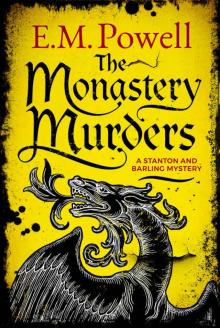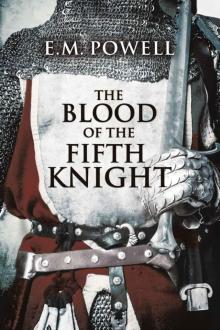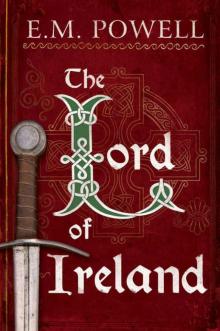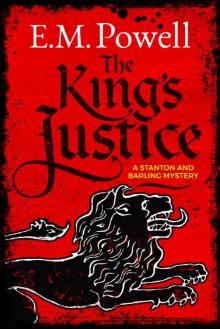- Home
- E. M. Powell
The Monastery Murders
The Monastery Murders Read online
PRAISE FOR E.M. POWELL
‘The plot moves swiftly. As a stand-alone novel, this book more than holds its own. A great follow-up to the first two books in the series – and highly recommended.’
—Historical Novels Review
‘E.M. Powell has created an immensely likeable pair in Stanton and Barling, in this exciting new medieval mystery series. Action-packed and laced with sly humour . . . I was completely riveted by The King’s Justice.’
—Mary Lawrence, author of The Alchemist’s Daughter
‘E.M. Powell’s medieval murder mysteries are like mead: sweet, potent, and seductively addictive. One sip and you won’t be able to stop reading.’
—Jane Holland, bestselling author of Girl Number One and Lock the Door
OTHER TITLES BY E.M. POWELL
Stanton and Barling Mysteries
The King’s Justice
The Fifth Knight Series
The Fifth Knight
The Blood of the Fifth Knight
The Lord of Ireland
This is a work of fiction. Names, characters, organizations, places, events, and incidents are either products of the author’s imagination or are used fictitiously. Any resemblance to actual persons, living or dead, or actual events is purely coincidental.
Text copyright © 2018 by E.M. Powell
All rights reserved.
No part of this book may be reproduced, or stored in a retrieval system, or transmitted in any form or by any means, electronic, mechanical, photocopying, recording, or otherwise, without express written permission of the publisher.
Published by Thomas & Mercer, Seattle
www.apub.com
Amazon, the Amazon logo, and Thomas & Mercer are trademarks of Amazon.com, Inc., or its affiliates.
ISBN-13: 9781503903241
ISBN-10: 1503903249
Cover design by Ghost Design
For Paul Fogarty: indefatigable source of wisdom, wit and wine
Contents
Chapter One
Chapter Two
Chapter Three
Chapter Four
Chapter Five
Chapter Six
Chapter Seven
Chapter Eight
Chapter Nine
Chapter Ten
Chapter Eleven
Chapter Twelve
Chapter Thirteen
Chapter Fourteen
Chapter Fifteen
Chapter Sixteen
Chapter Seventeen
Chapter Eighteen
Chapter Nineteen
Chapter Twenty
Chapter Twenty-One
Chapter Twenty-Two
Chapter Twenty-Three
Chapter Twenty-Four
Chapter Twenty-Five
Chapter Twenty-Six
Chapter Twenty-Seven
Chapter Twenty-Eight
Chapter Twenty-Nine
Chapter Thirty
Chapter Thirty-One
Chapter Thirty-Two
Chapter Thirty-Three
Chapter Thirty-Four
Chapter Thirty-Five
Chapter Thirty-Six
Chapter Thirty-Seven
Chapter Thirty-Eight
Chapter Thirty-Nine
Chapter Forty
Chapter Forty-One
Chapter Forty-Two
Chapter Forty-Three
Chapter Forty-Four
Chapter Forty-Five
Chapter Forty-Six
Chapter Forty-Seven
Chapter Forty-Eight
Chapter Forty-Nine
Chapter Fifty
Chapter Fifty-One
Chapter Fifty-Two
Historical Note
Acknowledgments
List of Characters
Bibliography
About the Author
Chapter One
Fairmore Abbey, North Yorkshire 24 December 1176
As a young man, Brother Maurice, novice master of Fairmore Abbey, had wondered why the old always seemed so ill-tempered.
He wondered no more. Had not wondered, in fact, for several years. Years which had taken his teeth, of which he had few now left. Which had taken his sight, completely in one eye, and with the same foul fog descending upon the other.
Years which had taken his mother and father, which, he supposed, was the way of things. Years which had taken many of his fellow monks too. Some had died after a long life, like his parents, while others had been called back to God after only a short time. The number of years mattered little. He could look into the dead face of a man he’d known for two decades and feel nothing. He could hold the hand of a man he had only known a few months as he slipped from this life and weep for days at his passing to heaven.
The prospect of his own death did not cause him any woe, though he hastened towards it daily.
For when it came he would sleep. Sleep properly.
Lack of rest, Maurice had long since concluded, was what made those advanced in years so quick to wrath. He would long for sleep throughout the day, have his head droop over and over as he prayed in the cloister, his slack mouth drooling on to the book that his useless eyes could no longer see. After the bell sounded for close of day, he would hasten to his sleeping mat in the monks’ dormitory, the mat that currently lay under his wretched, sleepless bones. An hour, maybe two, would see him in blissful repose.
And then he would wake, not as he did as a young man, refreshed and restored, but in despair, for he knew he would not close an eye again that night.
At least on this night, this most holy of nights, others would have as little sleep as him. For the great feast of the birth of Christ was almost upon them. The night Office of Vigils would take place earlier than usual. He loved this feast above any other, even if it served to remind him of how few he may have left.
In the cold darkness of the dormitory around him, the other brothers slept on, in their familiar, maddening chorus of loud snores, sharp snorts, bubbling breaths and farted wind.
When the monastery bells sounded for Vigils, he would be up in an instant. For him, rising in the depths of the night was easy. He was already awake. For the others, the sleepers, especially the novices under his care, young men all, it was a sort of agony.
Maurice grinned to himself. At least he had that advantage over the young. He had little else any more.
He rubbed his face, listening out for the muffled sounds of the awakening of the sacrist, Brother Cuthbert, who slept in a separate chamber at the top of the dormitory.
The quiet sacrist was a diligent man, never late in his duties at the monastery bells. A boring fellow too, but dependable.
It should be any time now. Maurice waited a few more minutes.
Nothing. Only the continued sounds of slumber around him.
He frowned to himself and sat up, pushing his coverlet from him. This would not do. Not on the feast of Christmas. Not on any night.
He rose from his bed, pulling his woollen cowl straight and smoothing out its creases as he slipped his stockinged feet into his waiting soft leather shoes. Then he made his way along the clear path between the two rows of beds towards Cuthbert’s little room. His poor sight deepened the room’s shadows but he had no fear of falling. The floor would be tidy and without obstruction, as it always was. He reached Cuthbert’s door and opened it without ceremony.
‘Cuthbert.’ His order was sharp, sharp enough to cause a few grumbles from those monks nearby. He peered closer.
Cuthbert’s bed lay empty, the coverlet rumpled.
By the Virgin: had he, Maurice, missed the bell? Have sense, man. Of course he hadn’t. Every other brother was still asleep. The deep peals to summon the monastery to prayer had not sounded.
&nbs
p; Maurice made his way over to the tiny shuttered window and pushed it open. The icy wind that gusted in made him gasp. The heavy snow of the last two days had stopped, leaving the land a mass of formless white and a black clear sky above it. Maurice could no longer see stars but he could make out the blur that was the waning moon. He squinted hard. Barely. It hung where he feared it might. They were going to be late. Late for Vigils. On the feast of the Nativity, of all days.
Cuthbert: how could you?
Maurice slammed the window shutter and grabbed the wooden tabula and stick that sat beside Cuthbert’s bed. ‘Rise, brothers, rise!’ He walked back out into the dormitory, struck the board loud and hard. ‘The day of Our Lord’s birth is here. Rejoice! Rise!’ He made the most noise he could over his yawning, stretching novices – cajoling, herding them towards the night stairs that led down to the church. He knew the other monks would follow after. He fell in behind the last of the novices hurrying down the stairs. ‘Let us go to praise—’ He thudded into the novice in front. ‘Move, boy. Move, all of you.’
A call came from below. ‘We can’t, brother.’
‘Can’t? Why not?’
‘The church door is locked, brother.’
The other monks had gathered behind Maurice and drowsy, confused grumbles came from them.
‘Brothers, why are you stopped?’ asked one.
‘Move down, move down,’ said another.
Maurice’s stomach tensed in his ire. They should not be stuck here like witless sheep in a pen. ‘Here, use my key.’ He handed it to the man before him, who passed it down the line.
He heard the church door open and another call came back up. ‘The church is in darkness, brother.’
Shocked exclamations met the novice’s words.
Maurice shared the shock. But he was angry now too. This was supposed to be a house of God.
‘Well, don’t just stand there!’ he shouted. ‘Go and light it. As many of you as possible.’
The novices did as instructed, Maurice hastening down the rest of the stairs and giving more orders as he entered the dark church.
‘You and you, light the candles. You: fetch the books. You: go and wake the lay brothers.’
Lights were flickering in the church by the time the abbot walked in, his face like thunder at being told the news.
He marched up to Maurice. ‘Why has Vigils been delayed, brother? What is going on?’
Maurice wondered if he had heard right. ‘We are only in this church because of me, my lord abbot. Me. Cuthbert is nowhere to be found. Had I not been awake, we might all have slept until daybreak.’
‘Then we commence the Office this very minute.’ The abbot turned on his heel. No acknowledgement of Cuthbert’s shortcomings. No acknowledgement of what he, Maurice, had done to save this precious day.
‘His wicked slothfulness has brought sin on us all, my lord abbot!’ Maurice was aware of every stunned face turned towards him, mouths open at his rudeness. ‘You will need to punish the lazy cur.’ He knew his temper was carrying him now. He couldn’t have stopped it if he’d tried. ‘Punish him. I’m going to find him, find him for you. Drag him back here to face his sinful, sinful shame.’
He stormed out of the church, past hands that reached out to try to placate him, stop him, and into the cloister.
‘Cuthbert!’ His furious yell echoed in the silent, freezing air as he marched along. He pulled in a deep breath to shout again.
Halted.
The night should smell of nothing except the fresh wind from the high moors.
But it smelled of . . . meat? Cooked meat?
No. Not meat. Not quite. It had a strange tang of metal to it. A horrible sweetness that went straight to the pit of his stomach.
Maurice was no longer angry. He was afraid. ‘Cuthbert?’ He set off again, at a run this time, uncaring of where he put his feet, running towards the stench, the stench that he now knew came from the monastery kitchen.
He flung open the door. And knew he’d found Cuthbert.
Afterward, in his prayers, he thanked God for his feeble, useless eyes.
They had spared him the worst of a sight that could only have come from the very depths of hell itself.
Chapter Two
Southwark, London 1 January 1177
While Hugo Stanton would never describe himself as a man of fervent faith, he did hold strong opinions about feast days. They were, without question, to be spent feasting. Feasting, drinking and, if his luck fell the right way, finishing the day in the arms and between the thighs of a willing woman. Yet on this, the great day of the Octave of Christmas, his usual plans had been ruined.
Instead, he sat in a damp wherry on the brown waters of the choppy Thames, waiting for a place at the busy landing at Southwark, being buffeted by an icy wind that drew no warmth from the colourless morning sun. He hauled his thick cloak tighter around him and tried not to think about spicy boiled beef, roasted capon, a number of sweetened cheese puddings, and cup after cup of good wine before a blazing fire.
‘You see, young Stanton?’ Aelred Barling, a senior clerk at the court of King Henry, sat opposite him, neat as ever in his dark robes and cloak and squinting in the brittle sunshine. The pale skin of Barling’s thin face was blotched pink from the chill. ‘The river is crammed with craft, as I knew it would be. I was correct in my estimation of the time it would take us to get here. It would not have done to be late. Lateness would mean we would see little of the bear.’
The bear. The one good thing about this trip with Barling. ‘I hope we do get to see it,’ replied Stanton. ‘Looks like plenty of other folk have had the same idea.’
Above, the creaking wooden wharf teemed with happy, noisy people. Most headed away from the riverside and into the busy streets of Southwark, with few travelling in the opposite direction.
The clerk frowned. ‘Fellow.’ He addressed their oarsman. ‘Make haste for us to land.’
‘Yes, sir.’ The man responded at once to his order, as people did. Barling was a small, slight man but carried with him the authority of the court and had the tone to match.
Although they now had a more amicable bond, Stanton had often faced a displeased Barling over the time they had been working together and he’d not enjoyed it. At all.
The wherry man forced their craft into a gap at the reeking, waste-clogged river’s edge, drawing abuse and oaths from those in other boats.
‘There you are, sir.’
‘The blessings of the day be upon you.’ Barling went to rise to his feet, almost overbalancing though the boat rocked little.
‘Thanks, good fellow.’ Stanton threw the man an extra coin. He grabbed hold of Barling and got him safely up the slippery wooden steps. The clerk might be twelve years older than Stanton’s twenty-two and deeply learned, but his deftness in any physical task was woeful.
‘You can let go of me now, Stanton.’ Barling smoothed down his neat tonsure, which had blown about in the wind. ‘We should hurry.’ He matched his words with his actions.
No thanks for Stanton’s help, just the usual determined stride through the crowd, ignoring the complaints of those he bumped into.
With a sigh and shake of his head, Stanton followed.
Stanton forced his elbows on to the chest-high wooden fence that surrounded the sawdust-floored bear pit. Its sturdy wall kept the gathering throng of loud, eager people out. It would also, he guessed, keep the animals in. Bear-baiting was a sport he’d always wanted to witness. He’d heard tell of the size and strength and ferocity of such animals but had never seen one for himself.
Not so Barling. ‘I have seen the spectacle several times,’ the clerk had said when Stanton had mentioned he’d be going. ‘A sport favoured by his Grace himself, with very good reason.’
Another enjoyable pastime to add to his feast day. Or so Stanton had thought, until he realised that Barling had decided to come with him. There was no way that Stanton could turn him down.
Worse, Barling was
going to use it as one of his lessons. Barling instructed as master and Stanton learned as pupil, the King’s clerk liked to say. Frequently. Stanton knew he had nobody to blame except himself. When he’d first encountered Barling, he’d been a messenger with the King’s travelling law court, a position he’d been desperate to leave. Seven months ago, when he and Barling solved the mystery behind a number of brutal murders, he’d had the opportunity to seek another position but he had failed to take it. Barling had persuaded him that he had an uncommon talent for finding the truth and so should work for the clerk, helping to bring wrongdoers to justice. Stanton had wondered throughout the time that had since passed whether he’d made the right choice.
He enjoyed much of it, especially the duties that meant riding a fast horse or seeking out a missing individual in the city’s alehouses. Other aspects had far less appeal. Like the lessons. Barling’s leaden presence could lower the highest spirits. The clerk would use events to question and debate Stanton’s judgements, sometimes for hours at a time. Still, even that was better than when Barling droned on at him about the law. He suspected that nothing would make Barling happier than to have Stanton in his own image: robed in black, hair in a tonsure and devoted to dry, dusty manuscripts and pipe rolls. Stanton would rather jump in the freezing, stinking river.
In the bear pit before them, a fool playing a whistle pranced around the enclosure, sending up puffs of fresh wood dust into the cold air. A small dancing dog dressed in the same yellow and red as its master followed him. The heavy wooden post in the centre of the pit stood empty, its dark, blood-stained surface giving promise of what was to come.
A fresh shiver went through Stanton, though this time not one of cold.
‘Unfortunately,’ said Barling, who stood to his right, ‘there is nothing to be learned from this japery.’
The fool danced on, the dog ducking back and forth under its owner’s high steps.
Stanton couldn’t help a laugh. ‘That little hound’s very good, Barling.’
The clerk sniffed.
The performer finished his tune with a low, low bow. His animal leapt up on to his back to a chorus of merriment and clapping. Still bent double, the man whipped off his cap and circled the pit for coins.

 The Monastery Murders
The Monastery Murders The Blood of the Fifth Knight
The Blood of the Fifth Knight The Lord of Ireland (The Fifth Knight Series Book 3)
The Lord of Ireland (The Fifth Knight Series Book 3) The King’s Justice
The King’s Justice